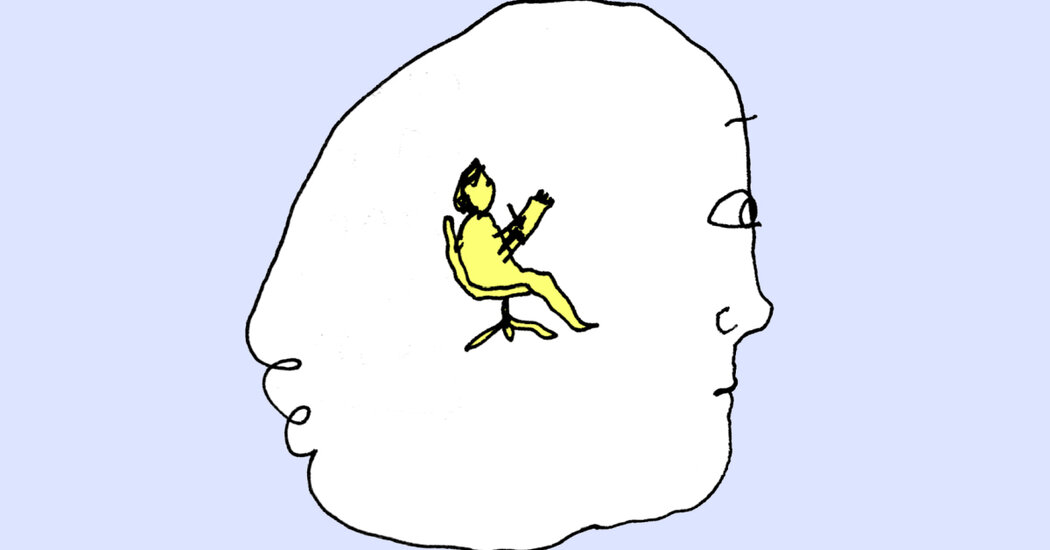What Your Therapist
Doesn’t Tell You
A dozen counselors on what it’s really like to sit in the other armchair.
Certain things, they just can’t
say to your face
“I definitely have to suppress instincts and take myself out of ‘me mode’ sometimes. …
… Maybe from my own point of view, I’m like: ‘Yes! Break up with that person! Run as fast as you can!’ But from a therapy perspective, I have to empower them to make that choice. I’m only seeing a person for one hour a week, and I might not have the full picture, so I shouldn’t make decisions for someone else. It comes with practice. Honestly, sometimes you do really just want to jump out and be like ‘Do not do this.’”
— T. Rochelle Tice, L.C.S.W.
“ ‘I need to pee so bad.’ Clients don’t realize that we have five minutes between sessions and sometimes making it to the bathroom is not possible.”
— Jessa White, L.M.H.C.A.
“One time a client asked me to write an emotional-support-animal letter for her pet hedgehog. This is outside my wheelhouse, and I declined to do it. She was so upset that she stopped coming to therapy.”
— Han Ren, Ph.D.
“ ‘What is her husband’s name again?’ I’m terrible at remembering names no matter how hard I try.”
— Jenn Hardy, Ph.D.
“ ‘I suck as a therapist right now.’ ”
— Shani Tran, L.P.C.C., L.P.C.
It is personal
“I work with many Asian Americans seeking an Asian American therapist. I feel — and other therapists of color I know feel this, too — as if we do share more of ourselves in the room. When a client says they struggle with shame or guilt from a parent pushing them constantly, I share that I can relate to that, because my mom was also very tough. I only share things that feel kind of matter-of-fact to me, not emotional things that could hijack the session.”
— Thien Pham, L.M.F.T.
Your wildest confessions are
their 9-to-5
“I work with couples, and I’ve seen a lot of truth bombs come out. Once you build the safe space with clients, you get a lot of superintense moments — people have slapped their partners, or decided to break up in the session, or exploded and stormed off — and you just have to keep it together. There’s been quite a few times where someone had an unexpected outburst and I’m just sitting there, internally like: ‘What? Did they just say that? OK, we cannot react, we cannot react. … ”’
— T. Rochelle Tice, L.C.S.W.
The therapy-speak is out of control
“Within the last five years, I’ve noticed vocabulary coming into the therapy session, which people seem to be picking up online. …
… We have normalized going to therapy and consuming mental health content — pop psychology has entered the chat! — but there are cons to it. Young people are hearing a lot of messaging around everything being ‘trauma.’ I think that is really dicey. I am not in favor of widening the clinical definition of trauma, because of the potential to look for trauma in places where it may not exist. And I feel people are also becoming more boundaried, shifting to this kind of cancel culture. Sometimes people think that cutting other people off is self-care, and they may be right. But sometimes you can have a conversation with someone and let them know they upset you, and work through it to have a stronger relationship as a result. I think people are losing those social skills involved in rupture and repair.”
— Jacquelyn Tenaglia, L.M.H.C.
“There has been a large adolescent pool coming in that is familiar with therapy topics — but a very new, broader, more nebulous definition of them. The terminology fluency really caught me by surprise. What’s been really difficult to navigate is when a parent drops off their kid like, ‘Here’s my kid, fix them for me,’ and the kid is like, ‘I’ve been gaslit by narcissists!’”
— Kyle Standiford, Psy.D.
“I think most people are annoyed by the ‘therapy language’ that is coming in, but I want to bring a humility to it. I think the fact that people are coming in wanting to talk about their ‘insecure attachment’ or their ‘avoidant personality disorder’ is kind of wonderful. I appreciate it helping us become less hierarchical in our profession. So I say, let’s be curious with them about it, instead of feeling like, ‘They don’t know what they’re talking about, because I am the expert.’”
— Elizabeth Cohen, Ph.D.
The intensity is inescapable
“Twenty years ago, when I used to practice in Argentina, I saw middle-class clientele who came in with employment and health insurance. Then I came to the U.S. and started to work in community mental health. Many of my clients were marginalized Latinos; they had linguistic barriers, they were in constant migration, or escaping violence. You can’t do psychotherapy if a person doesn’t feel safe — there’s no way that’s going to happen. Sometimes you’re veering toward being a social worker or case manager. You’re doing things like getting in your car and meeting someone who just fled an abusive relationship and is waiting for you in a parking lot with a bag full of clothes and nowhere to go, or you’re in heart-wrenching situations with unaccompanied minors who have just made it past U.S. Border Patrol from rural parts of Guatemala or El Salvador. It is deeply meaningful and fulfilling sometimes. But it’s frustrating too, because as a therapist, you feel you can’t really offer what you signed up for.”
— Gabriela Sehinkman, Ph.D., L.I.S.W.-S.
They all see clients differently
“Therapy itself, it’s a bit of a dance — you want to see what the other person is bringing, and you dance with them. If they’re doing a waltz, you can’t break out hip-hop, and there are times when people just don’t want to dance.”
— Peter Chan, Psy.D.
“Most therapists are trained and taught to sit back and not show too much of themselves in the room. But I want to share bits here and there just to make people feel they are not alone, and to make them feel that they’re not crazy. To me, therapy is very much like dating, except, you know, obviously you don’t really want to date the person.”
— Thien Pham, L.M.F.T.
“I spend time in spaces like TikTok and Twitter and the gaming sphere; knowing what’s going on in gaming culture is really important for my young male clients, and this helps me connect with them.”
— Kyle Standiford, Psy.D.
Covid changed everything
“During Covid, I had this uncanny experience in which different people would almost say the same things in sessions, sometimes verbatim, around their emotions, week after week. People would come in with the same tone and tenor — so it was almost like an emotional forecast, and I could say to people: ‘Listen, this week, don’t be surprised if you feel angry. I’ve heard this three times just today.’ It was uncanny to see this broader, collective grief response. This very intense depression, anger, numbness. It captured a way that we are all connected. It’s hard for an individual to put themselves into context, but there was no denying, for me, these trends that I would see. My belief is that therapy, at its core, is a way to understand our emotional worlds and the ways we struggle as an individual — but while I used to focus more on diagnosing symptoms and putting them into a constellation of a personality structure or a disorder, now I take a lot more of an existential, zoomed-out perspective, and I think a lot of our problems stem from trying to find meaning and purpose in our lives. Now I can see how so many things go unprocessed in our emotions and seem unrecognizable to us. Ever since Covid, I have dedicated a lot more of my time and resources toward psychoeducation for a wider audience.”
— Lakeasha Sullivan, Ph.D.
Interviews have been edited and condensed for clarity.
Amy X. Wang is assistant managing editor for the magazine. She has written about the voyeuristic pleasures and pains of dogsitting for New York City’s wealthy and the widespread desire for expensive designer handbags prompting a profusion of cheap, phenomenally accurate counterfeits.




